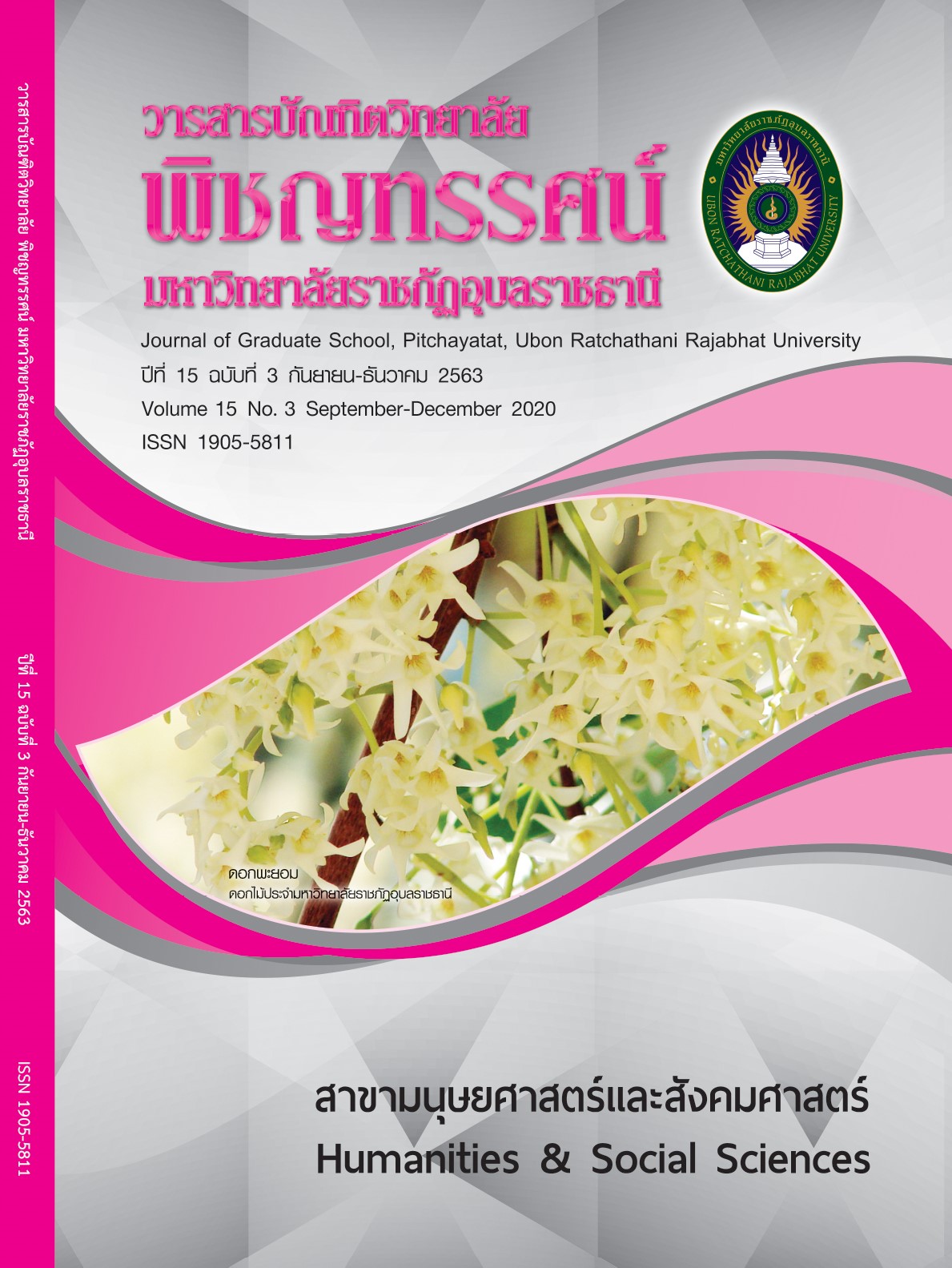กระบวนทัศน์วิถีพุทธที่สัมพันธ์กับการใช้พลังงานไฟฟ้าในอนุภูมิภาคลุ่มน้ำแม่โขง
คำสำคัญ:
กระบวนทัศน์, พลังงานไฟฟ้า, วิถีพุทธ, อนุภูมิภาคลุ่มน้ำแม่โขงบทคัดย่อ
งานวิจัยนี้มีวัตถุประสงค์เพื่อ 1) ศึกษากระบวนทัศน์วิถีพุทธที่สัมพันธ์กับการใช้พลังงานไฟฟ้า ในประเทศไทยและ สปป.ลาว 2) เพื่อวิเคราะห์องค์ประกอบ กระบวนทัศน์วิถีพุทธ ที่สัมพันธ์กับการใช้พลังงานไฟฟ้า 3) จัดทำข้อเสนอนโยบายและยุทธศาสตร์การพัฒนาการใช้พลังงานไฟฟ้าที่สอดคล้องกับวิถีชีวิต วัฒนธรรม และบริบทของประเทศไทย และจัดทำคู่มือการใช้พลังงานไฟฟ้า โดยใช้วิธีวิจัยเชิงคุณภาพ พื้นที่ประเทศไทย จังหวัดเชียงรายและหนองคาย พื้นที่ สปป.ลาว แขวงบ่อแก้วและแขวงสาละวัน และการวิจัยเชิงปริมาณ พื้นที่ประเทศไทย จังหวัดปทุมธานี ตัวอย่างได้แก่ ผู้ใช้พลังงานไฟฟ้า พระภิกษุสามเณรและชาวบ้านในประเทศไทย จำนวน 30 คน และในประเทศสาธารณรัฐประชาธิปไตยประชาชนลาว จำนวน 30 คน ได้มาโดยการเลือกแบบเจาะจงและกลุ่มผู้เกี่ยวข้องในจังหวัดปทุมธานี จำนวน 500 คน เครื่องมือที่ใช้ได้แก่ แบบสอบถาม สถิติที่ใช้ได้แก่ ค่าเฉลี่ย ส่วนเบี่ยงเบนมาตรฐาน และการวิเคราะห์องค์ประกอบ
ผลการวิจัยพบว่า
- กระบวนทัศน์วิถีพุทธที่สัมพันธ์กับการใช้พลังงานไฟฟ้าพบกรอบพฤติกรรมที่พึงประสงค์ตามศิล 5 หกประการคือ 1) ขยัน 2) ซื่อสัตย์ 3) เสียสละ 4) กตัญญู 5) ประหยัด 6) สะอาด
- องค์ประกอบกระบวนทัศน์วิถีพุทธที่สัมพันธ์กับการใช้พลังงานไฟฟ้า มี 7 องค์ประกอบได้แก่ 1)พุทธศาสนิกชนที่ดี 2) วิถีชีวิตคนชนบทและภูมิทัศน์บ้านเรือนแบบกุฏิสงฆ์ 3) การผลิตไฟฟ้าพร้อมจัดระบบชุมชนศีล 5 4) วัด 5) ความกตัญญู 6) บวร บ้าน - วัด – ส่วนราชการ 7) งานวัดตามบุญประเพณี 12 เดือน
- ข้อเสนอนโยบายและยุทธศาสตร์การพัฒนาการใช้พลังงานไฟฟ้า ได้แก่ ส่งเสริมและสนับสนุนให้ข้าราชการได้ฝึกอบรมตน ส่งเสริมและสนับสนุนการมีส่วนร่วมของชุมชน ส่งเสริมให้วัดเป็นแหล่งศูนย์รวมจิตใจชองชุมชน ส่งเสริมให้ประชาชนรักษาแบบแผนวิถีไทยวิถีพุทธ ส่งเสริมให้ บ้าน วัด โรงเรียนมีความสัมพันธ์กัน ส่งเสริมให้ภาครัฐและประชาชนฟื้นฟูประเพณีงานบุญประเพณี 12 เดือน
เอกสารอ้างอิง
พระใบฏีกาสุพจน์ เกษนคร. ชุมชนวิถีพุทธ. (ออนไลน์) 2562 (อ้างเมื่อ 25 กรกฎาคม 2562). จาก https://www.gotoknow.org/posts/439633.
พระพรหมคุณาภรณ์ (ป.อ. ปยุตฺโต). พจนานุกรมพุทธศาสตร์ ฉบับประมวลธรรม. พิมพ์ครั้งที่ 12. กรุงเทพฯ: การศาสนา, 2546.
สุภางค์ จันทวานิช. การวิเคราะห์ข้อมูลในการวิจัยเชิงคุณภาพ. พิมพ์ครั้งที่ 10. กรุงเทพฯ: สำนักพิมพ์แห่งจุฬาลงกรณ์มหาวิทยาลัย, 2554.
ดาวน์โหลด
เผยแพร่แล้ว
รูปแบบการอ้างอิง
ฉบับ
ประเภทบทความ
สัญญาอนุญาต
บทความทุกเรื่องได้รับการตรวจความถูกต้องทางวิชาการโดยผู้ทรงคุณวุฒิภายนอกอย่างน้อย 3 คน ความคิดเห็นในวารสารพิชญทรรศน์เป็นความคิดเห็นของผู้นิพนธ์มิใช่ความคิดเห็นของผู้จัดทำ จึงมิใช่ความรับผิดชอบของวารสารพิชญทรรศน์ และบทความในวารสารพิชญทรรศน์สงวนสิทธิ์ตามกฎหมายไทย การจะนำไปเผยแพร่ต้องได้รับอนุญาตเป็นลายลักษณ์อักษรจากกองบรรณาธิการ





